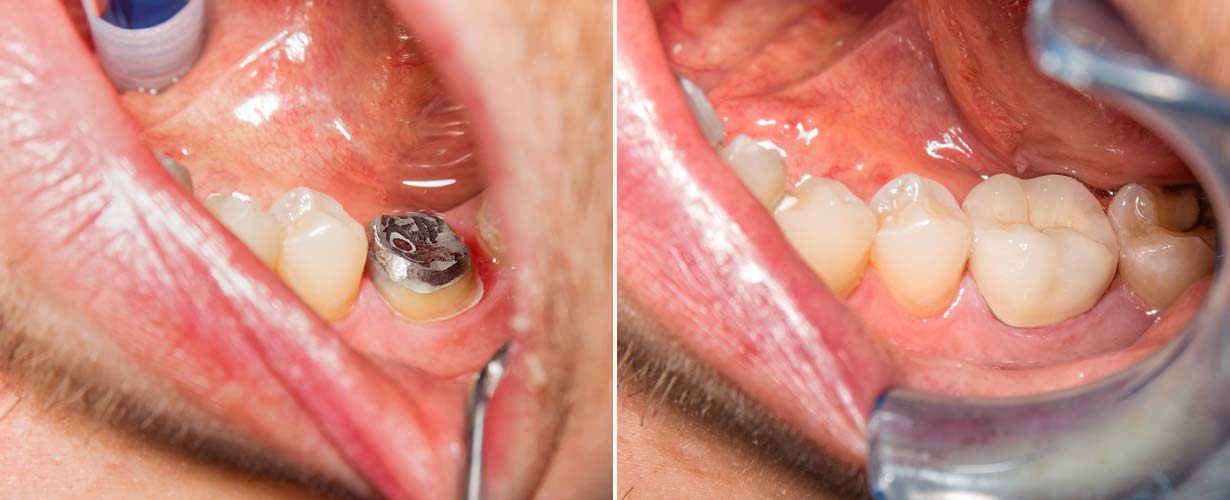Australian Made Crowns & Bridges
Natural looking, high quality, and durable
How much do crowns cost? Are they covered by private health?
Depending upon your private health option with your current provider, most private insurers cover a generous percentage of the dental crown and tooth restoration treatment.
Generally, ceramic dental crowns are part of insurers’ “major/extras” cover. Please contact your insurer to clarify your options.
As a result of each patient’s teeth being individually unique, there are multiple factors that may affect the cost of crowns. These may include the location of the tooth, sizing, and material. The damage to your current tooth may also affect the overall cost of your dental crown since your tooth or teeth need to be repaired prior to applying a crown.
An average cost estimate of our dental crowns would be $1,600 per tooth*. Please take note of the above factors that may vary this pricing. This may influence the cost to be lower or more than this average cost estimation. Particularly if prior treatment is required such as extraction, gum disease, and filling on neighbouring teeth.
Dental Crowns are usually recommended as a measure of treatment by dentists after performing a dental checkup and examination of a patient’s oral health.
Please don’t hesitate to contact us to discuss your situation. Feel free to call us directly on 07 3633 0055 for further details.
Is it painful to have crowns put on a tooth?
Implementing a crown on your tooth should be painless. If you’re concerned of the process or have sensitive teeth, usually our dentists will apply an anesthetic numbing agent.
If you have had a severely damaged tooth, you may experience some discomfort in the early stages since your neighbouring teeth accommodate the empty area that may have been missing or damaged prior.
There may also be some tenderness and soreness after the crown procedure as the anesthesia subsides.
How long do Crowns last for & do I need them permanently?
On average dental crowns should last between 10-15 years. This may also be influenced by your oral hygiene and lifestyle. Meaning, regular dental checkups, flossing, brushing and the use of mouth wash to assist with preventing gum disease and tooth decay.
I broken my crown. What do I do?
If you have damaged or severely cracked your current dental crown, please contact us immediately 07 3633 0055.
If the crown has become dislodged or loose, you may remove the crown to prevent swallowing it. Please rinse your mouth with warm water afterwards. If possible take care of your dislodged crown in a soft napkin to present to us for repair. We may be able to repair the crown with resin. With more damaged cases, a new crown may need to be made. Please follow the same process if you have damaged your crown bridge.
On average, a crown may take around 2 weeks to make or less dependent upon your requirements.
Is a porcelain veneer the same as a porcelain crown?
Veneers and Crowns are two different forms of teeth restorations. They are both similar in that they act as a surface layer to existing teeth and their aesthetic improvements.
The primary differences between the two are the amount of surface layering required, thickness of materials and the amount of tooth removed from the existing tooth.
A veneer is generally made of either porcelain or composite resin that is bonded to the surface of the tooth. Veneers require less tooth to be removed since they act as a top thin layer. This may involve the removal of the top enamel to accommodate the reshaping area of the tooth. Veneers are recommend for patients that are looking for aesthetic improvements, such as stained teeth, large gaps, alignment, and cracks. Veneers can be ordered for a single tooth, but are usually applied in multiples since the adjacent teeth compliment the alignment and minor gaps of neighboring teeth.
In comparison, a dental crown encapsulates the entire tooth. They can be made of porcelain, metal or a combination of both, which is otherwise known as “porcelain fused metal”. Metal options can consist of gold or metal based alloys. Crowns are usually recommended for patients that have fundamental issues with their tooth such as severe decay or root canal treatment. The crown is applied to act as a defensive mechanism against further damage or decay.
Our crowns are all-ceramic/all-porcelain for a more natural look. All-ceramic crowns have the best aesthetic appearance to match your existing teeth shading. The can be used for both front and back teeth.
How do I maintain a crown or my dental bridge?
Managing your dental crown or bridge is similar to maintaining good oral health with standard teeth.
- Brush at least twice a day. With gentle and soft brushing around the crown.
- Floss.
- Regular dental checkup, scale and cleans.
- Good oral hygiene with food, drinks, and not smoking.
- Avoiding hard objects such as chewing ice, hard or sticky lollies and deserts, hard fruits or bone meats.
- Sugars or acidic foods in moderation.



